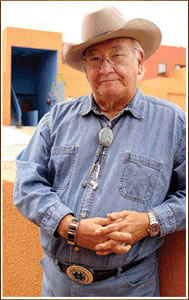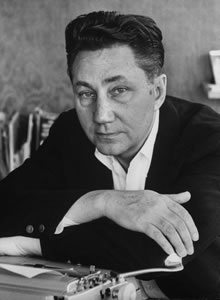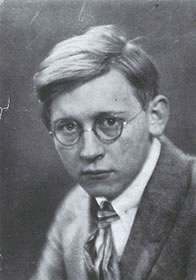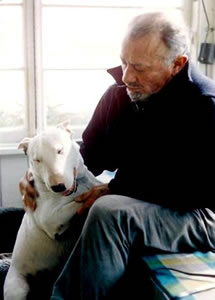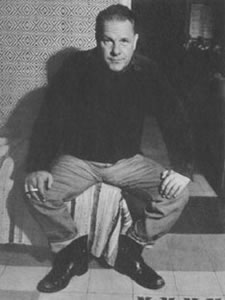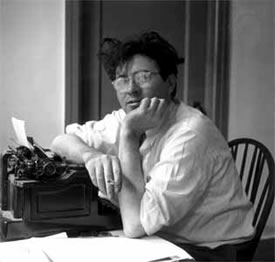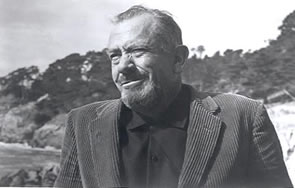De Amerikaanse schrijver John Steinbeck werd geboren in Salinas, Californië, op 27 februari 1902. Steinbeck schreef in een naturalistische/realistische stijl, vaak over arme mensen uit de arbeidersklasse. Zijn werk The Grapes of Wrath (De druiven der gramschap) vertelt het verhaal van de Joads, een arme familie uit de Amerikaanse staat Oklahoma tijdens de “Dust Bowl”, en hun reis naar, en hun problemen in de staat Californië. East of Eden is waarschijnlijk het belangrijkste werk van Steinbeck John Ernst Steinbeck is van gemengde komaf. De familie van zijn vader was van Duitse afkomst en die van zijn moeder kwam van Noord Ierland. John Steinbeck bracht zijn jeugd door in Monterey County in de Salinas Valley.
In 1919 studeerde hij af aan de hoge school van Salinas. Hij ging naar Stanford universiteit, waar hij mariene biologie studeerde. Maar hij maakte zijn studies niet af. In 1925 ging hij naar New York City, waar hij werkte als journalist voor ‘The American’, om schrijver te worden. Maar hij kon zijn werkstukken niet gepubliceerd krijgen, waardoor hij uiteindelijk terugkeerde naar Californië.
In Californië bleef hij schrijven en in 1929 werd zijn eerste boek gepubliceerd, Cup of Gold. Tortilla Flat (1935) was het keerpunt in Steinbecks carrière. Hiervoor ontving hij een gouden medaille voor beste debuut van een Californische schrijverskring. In 1962 volgde de ultieme bekroning voor zijn schrijverscarrière, hij ontving de Nobelprijs voor de literatuur.
Uit: The Grapes of Wrath
“Then, with time, the squatters were no longer squatters, but owners; and their children grew up and had children on the land. And the hunger was gone from them, the feral hunger, the gnawing, tearing hunger for land, for water and earth and the good sky over it, for the green thrusting grass, for the swelling roots. They had these things so completely that they did not know about them any more. They had no more the stomach-tearing lust for a rich acre and a shining blade to plow it, for seed and a windmill beating its wings in the air. They arose in the dark no more to hear the sleepy birds’ first chittering, and the morning wind around the house while they waited for the first light to go out to the dear acres. These things were lost, and crops were reckoned in dollars, and land was valued by principal plus interest, and crops were bought and sold before they were planted. Then crop failure, drought, and flood were no longer little deaths within life, but simple losses of money. And all their love was thinned with money, and all their fierceness dribbled away in interest until they were no longer farmers at all, buy little shopkeepers of crops, little manufacturers who must sell before they can make, Then those farmers who were not good shopkeepers lost their land to good shopkeepers. No matter how clever, how loving a man might be with earth and growing things, he could not survive if he were not also a good shopkeeper. And as time went on, the business men had the farms, and the farms grew larger, but there were fewer of them.
Now farming became industry, and the owners followed Rome, although they did not know it. They imported slaves, although they did not call them slaves: Chinese, Japanese, Mexicans, Filipinos. They ice on rice and beans, the business men said. They don’t need much. They couldn’t know what to do with good wages. Why, look how they live. Why, look what they eat. And if they get funny–deport them.”
John Steinbeck (27 februari 1902 – 20 december 1968)
De Britse schrijver Lawrence George Durrell werd geboren op 27 februari 1912 in jalandhar in India. Zijn opleiding kreeg hij in Engeland waar hij nooit echt gelukkig was. Hij noemde zich zelf dan ook liever cosmopoliet. Zijn beroemdste werk is de romantetralogie The Alexandria Quartet. Het eerste deel ervan, “Justine”, verscheen in 1957. Daarna volgden “Balthazar” (1958), “Mountolive” (1959) and “Clea” (1960). Het werk beschrijft de gebeurtenissen in het Alexandrië van voor de Tweede Wereldoorlog.
Uit: Balthazar (1958)
“The desert,” said Narouz. “By the way, will you ride out with me to the tents of Abu Kar to-morrow? I have been promised an Arab and I want to break it myself. It would make a pleasant excursion.” Nessim was at once delighted at the prospect. “Yes” he said. “But early, ” said Narouz, “and we can pass the olive plantation for you to see what progress we’re making. Will you? Please do! . . . Oh, Nessim! I wish you stayed here. Your place is here.”
Nessim as always was beginning to wish the same. That night they dined in the old-fashioned way–so different from the impertinent luxury of Alexandrian forms–each taking his napkin from the table and proceeding to the yard for the elaborate handwashing ceremony. . . . At last, when sweetmeats and fruit had been served, they returned once more to where the waiting servants stood and washed their hands again.
. . . Smoking materials had been set out . . . [H]e sat with his chin in his hand wondering how he could impart his news, . . . and whether he should be frank about his motives in choosing for a wife a woman who was of a different faith from his own [Justine is Jewish. Eds.]. The night was hot and still, and the scent of magnolia blossom came up to the balcony in little drifts and eddies of air which made the candles flutter and dance; he was gnawed by irresolution.
. . . The little viol scribbled its complaints upon the text reaching back into their childhood. And now suddenly the singer burst into the passionate pilgrim song which expresses so marvellously the Moslem’s longing for Mecca and his adoration of the Prophet–and the melody fluttered inside the brothers’ hearts, imprisoned like a bird with beating wings. Narouz, though a Copt, was repeating “All-ah, All-ah! in a rapture of praise.
. . . As he stood in the doorway, Nessim said impulsively: “Narouz–I’ve something to tell you. . . . But it will keep until to-morrow. We shall be alone, shan’t we?” Narouz nodded and smiled. “The desert is such torture for them that I always send them back at the fringe, the servants.”
“Yes.” Nessim well knew that Egyptians believe the desert to be an emptiness populated entirely by the spirits of demons and other grotesque visitants from Eblis, the Moslem Satan.
Nessim slept and awoke to find his brother, fully dressed, standing beside his bed with coffee and cigarettes.” . .
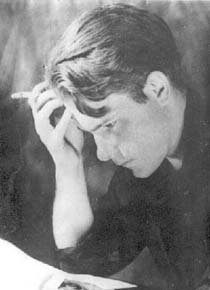
Lawrence Durrell (27 februari 1912 – 7 november 1990)
De Amerikaanse schrijver James Thomas Farrell werd geboren op 27 februari 1904 in Chicago. Hij bezocht de Mt. Carmel High School en studeerde daarna aan de universiteit van Chicago. Hij begon met schrijven toen hij 21 jaar was. Hij is bekend voor zijn realistische beschrijvingen van de Ierse werkende klasse in Chicago Zuid. Zijn werk is autobiografisch van aard. Zijn meest bekende werk is de trilogie Studs Lonigan. Deze werd in 1960 verfilmd en in 1979 volgde er nog een tv-serie.
Uit: Judgment Day (Studs Lonigan)
“Grim-faced men in working clothes and overalls with an interspersing of women in their ranks marched slowly along a high fence surrounding a factory in a mid-western town, watched by special deputies who stood at regularly-spaced intervals with clubs and truncheons ready. Above the geometrically patterned factory windows, two chimneys smoked.
“When non-striking workers attempted to relieve the day shift at this factory, they were attacked by strikers. And look at this for a sample of some real serious rioting,” the announcer called in the same tone as if he were describing a heroic hundred-yard run on a college gridiron, and simultaneously with his words the screen presented men struggling and grappling, tugging, wrestling, raising a cloud of dust, and howling and cursing as they fought, groups coming together amidst flying bricks and swinging clubs, policemen breaking groups apart shagging overalled men from the factory gates with raised clubs. A fleeing man in overalls was clubbed by a policeman, and as he fell groggily forward, a special deputy smashed him on the shoulder with a truncheon. He lay face forward in the center of the picture, blood oozing from his head, and the struggling crowd surged over his body.
Guarded by policemen with drawn guns, a sick-faced, injured, bleeding group of strikers sat dazed in the dusty street, and one full-faced policeman turned to smile into the camera.
“Poor bastards,” Pat mumbled.
“This unfortunate riot resulted in the injury of scores. Two strikers and one deputy were taken to a local hospital in a critical condition with their skulls fractured. Not the best form of sport, I’d say, and it is to be regretted that such altercations occur and to be hoped that they are not repeated.”
James T. Farrell (27 februari 1904 – 22 augustus 1979)
De Amerikaanse dichter Henry Wadsworth Longfellow werd geboren in Portland, Maine, op 27 februari 1807. Longfellow studeerde in Harvard. Hij werd bibliothecaris. Na een reis door Europa (1826-1829) werd hij de eerste hoogleraar in de moderne talen. In 1831 trouwde hij met Mary Storer Potter, die in 1835, tijdens een nieuwe reis door Europa, in Rotterdam overleed. Hij huwde later met Frances Appleton. In 1854 verliet hij Harvard om zich volledig aan het schrijven te wijden. Hij ontving in 1859 een eredoctoraat. In 1861 verloor hij zijn vrouw door een brand. Aan die gebeurtenis wijdde hij het nog steeds veel gelezen sonnet The Cross of Snow. In zijn tijd was zijn poëzie buitengewoon populair, maar slechts een klein deel van zijn omvangrijke oeuvre wordt nog gelezen. Longfellow maakte ook vele vertalingen en heeft daardoor veel Europese poëzie voor Amerikanen toegankelijk gemaakt.
A DAY OF SUNSHINE.
O GIFT of God! O perfect day :
Whereon shall no man work, but play ;
Whereon it is enough for me,
Not to be doing, but to be!
Through every fibre of my brain,
Through every nerve, through every vein,
I feel the electric thrill, the touch
Of life, that seems almost too much.
I hear the wind among the trees
Playing celestial symphonies ;
I see the branches downward bent,
Like keys of some great instrument.
And over me unrolls on high
The splendid scenery of the sky,
Where through a sapphire sea the sun
Sails like a golden galleon.
Towards yonder cloud-land in the West,
Towards yonder Islands of the Blest,
Whose steep sierra far uplifts
Its craggy summits white with drifts.
Blow, winds ! and waft through all the rooms
The snow-flakes of the cherry-blooms !
Blow, winds ! and bend within my reach
The fiery blossoms of the peach !
O Life and Love ! O happy throng
Of thoughts, whose only speech is song !
O heart of man ! canst thou not be
Blithe as the air is, and as free ?
Henry Longfellow (27 februari 1807 – 24 maart 1882)
De Amerikaanse (native, Kiowa) schrijver N(avarre) Scott Momaday werd geboren op 27 februari 1934 in Lawton, Oklahoma. Hij was de zoon van de schrijver Natachee Scott Momaday en de schilderes Al Momaday. Zijn roman House Made of Dawn betekende de doorbraak van de “native” literatuur in de mainstream literatuur. Momaday kreeg er de Pulitzer Prize for Fiction voor in 1969.
Uit: House Made of Dawn
“The Kiowas are a summer people; they abide the cold and keep to themselves, but when the season turns and the land becomes warm and vital they cannot hold still; an old love of going returns upon them. The old people have a fine sense of pageantry and a wonderful notion of decorum. The aged visitors who came to my grandmother’s house when I was a child were men of immense character, full of wisdom and disdain. They dealt in a kind of infallible quiet and gave but one face away; it was enough. They were made of lean and leather, and they bore themselves upright. They wore great black hats and bright ample shirts that shook in the wind. They rubbed fat upon their hair and wound their braids with strips of colored cloth. Some of them painted their faces and carried the scars of old and cherished enmities. They were an old council of war lords, come to remind and be reminded of who they were…”
N. Scott Momaday (Lawton, 27 februari 1934)
De Duitse schrijfster en dichteres Elisabeth Borchers werd geboren in Homberg op 27 februari 1926. Tijdens de oorlog verbleef zij bij haar grootouders in de Elzas. Van 1945 tot 1954 werkte Borchers als tolk voor de Franse bezettingsmacht. Van 1958 tot 1960 verbleef zij in de VS. Van 1960 tot 1971 was zij lector voor de uitgeverij Luchterhand, daarna voor Suhrkamp en de Insel Verlag. Naast gedichten schreef zij ook talrijke kinderboeken.
April
Es komnmt eine Zeit
mit Regen
mit Hagel
mit Schnee.
Mit Wind, der um die Ecke stürzt,
der nimmt dem Mann den Hut vom Kopf.
Ei, ruft der Mann, wo ist mein Hut?
Ei, ruft der Hut, wo ist mein Mann?
Und ist schon ganz weit oben.
Der Hahn auf goldner Kirchturmspitz,
der denkt:
Ich seh nicht recht.
Ein Hut ganz ohne Mann.
Ein Hut, der auch noch fliegen kann
und hat doch keine Flügel an.
Der Mann steht klein und dunkel da.
Der Wind ist längst vorbei.
September
Es kommt eine Zeit
da hat die Sonne
alle Arbeit getan
die Äpfel sind rot
die Birnen sind gelb
und die Marktfrauen rufen
Pflaumen schöne Pflaumen
Es kommt eine Zeit
da wird die Sonne müde
und immer kleiner
So klein wie eine Orange
die nach Afrika zurückrollt
wie ein Taler
der von einer Hand zu andern wandert
wie der Knopf
vom Matrosenkleid
So klein wird die Sonne,
daß der Himmel sie nicht mehr halten kann
Sie rollt übers Dach
rollt hintern Berg
jetzt kann sie keiner mehr sehen
Elisabeth Borchers (Homberg, 27 februari 1926)
De Franse schrijver en dichter Jules Lemaître werd geboren op 27 februari 1853 in Vennecy, Loiret. Hij schreef verhalen, komedies, gedichten, kritieken en levensbeschrijvingen. In 1895 werd hij lid van de Académie française. 1899–1904 Was hij oprichter en president van de Ligue de la Patrie française.
Uit: Chateaubriand
« Chateaubriand! Quelles images fait surgir aussitôt ce nom sonore? Une magnifique série d’attitudes et de costumes. Un enfant rêveur, dans les bruyères, autour d’un vieux château… Un jeune officier français chez les Peaux-Rouges, parmi des sauvagesses charmantes, dans la forêt vierge… Un livre qui fait rouvrir les églises et sortir les processions… Le clair de lune, la cime indéterminée des forêts, l’odeur d’ambre des crocodiles… Un écrivain jaloux de la gloire de Napoléon… Un royaliste qui sert le roi avec la plus dédaigneuse fidélité… Un vieillard sourd près du fauteuil d’une vieille dame, belle et aveugle… Un tombeau dans les rochers sur la mer…
Quoi encore? Il avait la plus belle tête du monde, et dont on ne conçoit les cheveux que fouettés par le vent. Il a su exprimer avec des mots plus de sensations qu’on n’avait fait avant lui. Il est l’homme qui a «renouvelé l’imagination française» (Faguet). Il est le père du romantisme et de presque toute la littérature du dix-neuvième siècle. Et il est l’inventeur d’une nouvelle façon d’être triste. »
Jules Lemaître (27 februari 1853 – 5 augustus 1914)
De Zwitserse schrijver Traugott Vogel werd op 27 februari 1894 als zoon van een groentehandelaar in Zürich geboren. Na korte studies aan diverse universiteiten koos hij voor het beroep van leraar. Geïnspireerd door zijn beroep begon Vogel aan het begin van de jaren twintig jeugdboeken te schrijven. Maar zijn omvangrijke literaire bestaat tevens uit romans, verhalen, hoorspelen entheaterstukken. Hij zette zich in voor het behoud van het dialect en stimuleerde en begeleidde jonge schrijvers.
Uit: Die Diebskirche
„Aber mit einem Male reckte sie sich und spähte gegen den Eingang, der hinter den Geräten als abendliche Helligkeit zu erkennen war. Sie hielt den Zeigfinger gegen ihre schmalen, faltigen Lippen und sprach etwas ohne Laut: eine Warnung. Und schon zog sie mich in ein Versteck hinter Leitern und Wagenrädern, wo wir uns niederduckten und warteten.
Marco war vom Tale heimgekommen. Er stieg über Lumpen und Latten und blieb vor einer Sparkirche stehen. Zu beiden Seiten hielt er je ein grosses, vierpfündiges Brot unter den Arm geklemmt, und jeder Laib war tief angeknabbert: Das Weisse leuchtete wie eine Wunde in der dunklen Rinde.
Er warf die Brote hin und begann in seiner Tasche zu wühlen.
Ich konnte ihn zwischen den Speichen des Rades hindurch beobachten, sah aber nur einige schattenhafte Gebärden, nicht den Ausdruck seines Gesichtes, und stellte mir das Glühen seiner katzenhaft grünen Augen vor. Die Nacht kam aus den Winkeln unserer seltsamen, verwunschenen Bergkapelle gekrochen, und draussen war wohl der Abendhimmel am Erlöschen.
Ich begriff, dass es dem Burschen darum ging, den Ertrag des Tages auf diesem versteckten Altar abzuliefern. Zunächst war es wohl das Geldstück, das er als mein Träger verdient hatte, und das er nun in den Kirchturm einwarf. Ich hörte ein schabendes Geräusch, dann das Auffallen der Münze – und gleichzeitig schlug ein dünnes Glöcklein an. Bim, tönte es, wie zum Dank.
Er hielt still und lauschte dem silbernen Tönchen nach. Natalie neben mir presste ihre Fäuste gegen die Zähne. Sie schnaufte heftig. Hatte sie das Klingeln zu hören vermocht? Kaum.“
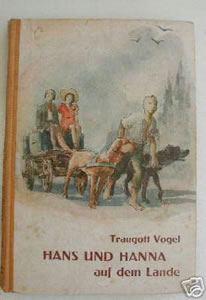
Traugott Vogel (27 februari 1894 – 31 januari 1975)
Boekomslag (Geen foto beschikbaar)





